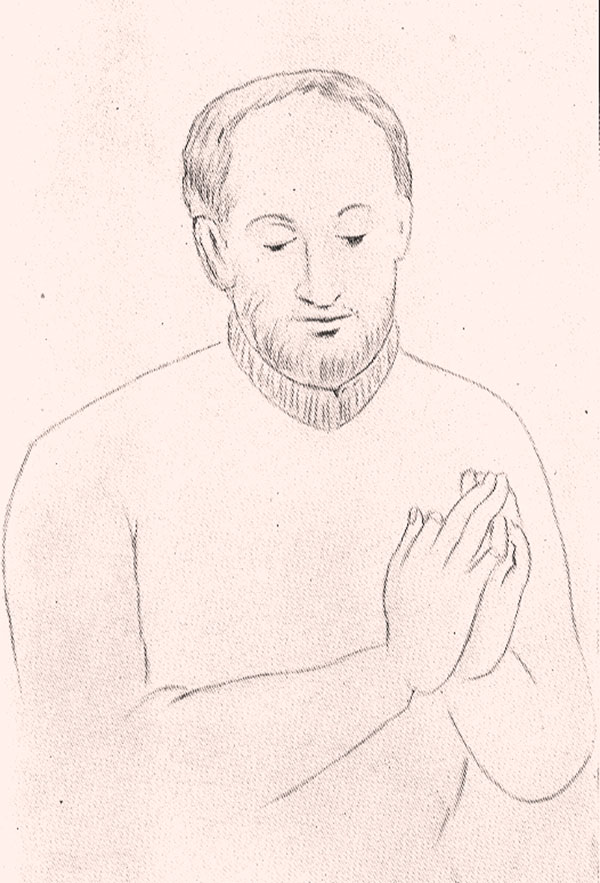Jogues’ Tale - 1643

Drawing of Jesuit missionary Isaac Jogues.
Introduction
Iroquois Indians captured Isaac Jogues, a Jesuit missionary in August 1642, along with three other Frenchmen and a number of Huron Indians. Jogues had escaped into the undergrowth, but gave himself up in order to minister to fellow-Frenchman René Goupil and some Huron converts. The Iroquois treated him brutally but let him live. In 1643 he escaped to a Dutch boat but out of consideration for Dutch families whom the Indians threatened in consequence, he abandoned his plan of escape. At that point on this day 30 August, 1643, he wrote a letter to his superior in Canada explaining his actions.
Quote
“I saw, moreover, that it was important that I should give them [the French] some warning of the designs, the arms and the treachery of our enemies, [so] I found means to secure a bit of paper in order to write to them…
“I knew very well the dangers to which I was exposing myself; I was not ignorant that, if any misfortune happened to those warriors, they would make me responsible therefor, and would blame my letters for it. I anticipated my death; but it seemed to me pleasant and agreeable, employed for the public good, and for the consolation of our French and of the poor savages who listen to the word of Our Lord. My heart was seized with no dread at the sight of all that might happen therefrom, since it was a matter of the glory of God; I accordingly gave my letter to that young warrior, who did not return. The story which his comrades have brought back says that he carried it to the fort of Richelieu, and that, as soon as the French had seen it, they fired the cannon upon them. This frightened them so that the greater part fled, all naked, abandoning one of their canoes, in which there were three arquebuses [a kind of musket], powder and lead, and some other baggage. These tidings being brought into the village, they clamor aloud that my letters have caused them to be treated like that; the rumor of it spreads everywhere; it comes even to my ears. They reproach me that I have done this evil deed; they speak only of burning me; and, if I had chanced to be in the village at the return of those warriors, fire, rage and cruelty would have taken my life. For climax of misfortune, another troop—coming back from Montreal, where they had set ambushes for the French—said that one of their men had been killed, and two others wounded. Each one held me guilty of these adverse encounters; they were fairly mad with rage, awaiting me with impatience. I listened to all these rumors, offering myself without reserve to our Lord, and committing myself in all and through all to His most holy will. The captain of the Dutch settlement where we were, not being ignorant of the evil design of those barbarians, and knowing, moreover, that Monsieur the Chevalier de Montmagny had prevented the savages of New France from coming to kill some Dutch, disclosed to me means for escape. ‘Yonder,’ said he to me, ‘is a vessel at anchor, which will sail in a few days; enter into it secretly. It is going first to Virginia, and thence it will carry you to Bordeux or to La Rochelle, where it is to land.’ Having thanked him, with much regard for his courtesy, I tell him that the Iroquois, probably suspecting that some one had favored my retreat, might cause some damages to his people. ‘No, no,’ he answers, ‘fear nothing; this opportunity is favorable; embark; you will never find a more certain way to escape.’ My heart remained perplexed at these words, wondering if it were not expedient for the greater glory of our Lord that I expose myself to the danger of the fire and to the fury of those barbarians, in order to aid in the salvation of some soul. I said to him then: ‘Monsieur, the affair seems to me of such importance that I cannot answer you at once; give me, if you please, the night to think of it. I will commend it to our Lord; I will examine the arguments on both sides; and to-morrow morning I will tell you my final resolution.’ He granted me my request with astonishment; I spent the night in prayers, greatly beseeching our Lord that he should not allow me to reach a conclusion by myself; that he should give me light, in order to know His most holy will; that in all and through all I wished to follow it, even to the extent of being burned at a slow fire. The reasons which might keep me in the country were consideration for the French and for the Savages; I felt love for them, and a great desire to assist them...”
Letter and Narrative of Father Isaac Jogues, 1643, 1645. In J. Franklin Jameson, ed., Narratives of New Netherland, 1609-1664 (Original Narratives of Early American History). NY: Charles Scribner's Sons, 1909.





